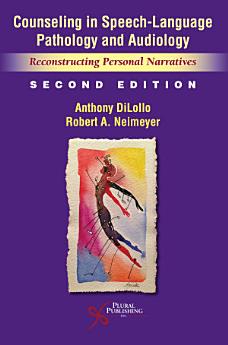Counseling in Speech-Language Pathology and Audiology: Reconstructing Personal Narratives, Second Edition
About this ebook
New to the Second Edition:
* 10 new chapters on the nature of change, critical thinking, culturally informed care, and preparing for the counseling relationship.
* A new case illustration and three new “tools”.
* A new Foreword by Sue Hale, MCD.
* Reorganized for improved flow of information with earlier introduction of the central framework, followed by chapters to build foundational knowledge and skills. The central framework for counseling has been simplified and reconfigured for easier integration into clinical practice.
* Based on user feedback, the “theory” chapters from the first edition have been dropped to make room for the added “knowledge and skill” chapters, giving the book a more practical feel.
* Discussion topics have been added at the end of all chapters in Parts I, II, and III.New images and illustrations throughout. Updated to reflect current research, with many new references added.
* Brief video commentaries by the authors introducing and discussing the main points for each chapter.
About the author
Anthony DiLollo, PhD, CCC-SLP, is a Professor and Director of the Davies School of Communication Sciences and Disorders at Texas Christian University. He has pulished numerous articles and book chapters on counseling and clinical practice that cater to audiences in audiology, speech-language pathology, and other health and helping professions. Dr. DiLollo is currently working on innovative ways to implement counseling preparation in clinical training programs by establishing it as a foundational skill on which further clinical practice is built.
Robert A. Neimeyer, PhD, is Professor Emeritus of the Department of Psychology at the University of Memphis, maintains an active counsulting and coaching practice, and also directs the Portland Institute for Loss and Transition. Dr. Neimeyer has published 30 books, including Routledge's series on Techniques of Grief Therpay, and serves as Editor of Death Studies. The author of over 500 articles and chapters and a popular workshop presenter, he is currently working toa dvance a more adequate theory of grieving as a meaning-making process. In recognition of his contributions, he has been given Lifetime Achievement Awards by both the Association for Death Education and Counseling and the Internationa Network on Personal Meaning.




